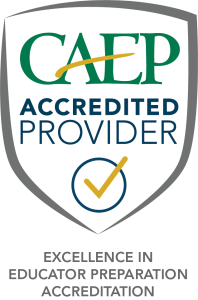Master of Science in Teaching
The Master of Science in Teaching (MST) is a 33 credit hour Master’s Degree program containing courses that integrate discipline-specific content and research-based instructional strategies. The overarching goal of this program is to improve the knowledge and skills of secondary mathematics and science teachers in order to improve the learning of their students. In addition to taking the specialized courses of the program focused on content and teaching and learning methods, MST students are required to conduct education research. Five of the required 33 hours are devoted to the completion of an education research thesis project.
The teacher preparation track of the Master of Science in Teaching Program offered by the Maine Center for Research in STEM Education (RiSE Center) is accredited by the Council for the Advancement of Educator Preparation (CAEP). Accreditation is a vital part of our work at the University of Maine as it ensures that our students, candidates and graduates have met specific standards for learning, experience and professional outcomes.
The RiSE Center was granted initial-licensure level accreditation by CAEP in April 2021. The next site visit will take place in Fall 2027. To achieve CAEP accreditation, institutions must meet several standards, showing that their graduates are competent and caring educators, and that their programs have the capacity to create evidence and use it to maintain and enhance program quality.
Participants in this program will:
- Strengthen their backgrounds in the subjects that they teach;
- Study topics included in the Learning Results but often not covered in traditional introductory math and science courses;
- Learn science and math in courses taught using research-guided pedagogy and curricula, including hands-on, inquiry based methods;
- Participate in courses that combine content and methods learning, rather than taking separate content and methods courses;
- Learn how to design, conduct, and interpret science and math education research;
- Obtain training in the effective use of technology in the secondary classroom;
- Have supervised teaching experience in classrooms implementing best practices indicated from research; and
- Work toward certification to teach at the secondary level in their field (if desired).
Some advantages of the M.S.T. degree:
- This program will attract additional students to science and mathematics teaching, both from existing major programs in-state and from out-of-state; thus it offers a step toward tackling the problem of severe teacher shortages in the state and nationwide in the sciences and mathematics.
- A Master’s Degree offers a way for in-service teachers to improve their credentials and raise their salaries. Only approximately 1/3 of Maine’s current teachers hold Master’s Degrees. There are ~10,000 teachers in the state currently teaching who do not have Master’s Degrees.
- Major portions of this program are planned to be offered through distance learning, evening and weekend classes, and during the summer, to accommodate the scheduling needs of in-service teachers.
- The coordination among disciplines in this program can strengthen creative interdisciplinary teaching at the secondary and University levels.
- This program offers a generalist Master’s Degree, which can prepare science and mathematics teachers well for positions in small, rural schools, where they will need to teach more than one subject at the secondary level.
- Courses developed for this program will also be available to undergraduates and will attract undergraduates to teacher training.
- Teaching assistants in this program will provide talented, motivated educators to assist in improving introductory courses offered at the University in science and mathematics.
- The program, with its faculty and graduate students, will help The University of Maine become a leader in conducting research in science and mathematics education. These areas are nationally very important and extremely fundable fields of scholarship.
- Expertise in science and mathematics education research on campus will lead to better teaching in mathematics and science courses at all levels at the University
This program is designed to benefit:
- Teachers who would like to strengthen their knowledge of the subjects that they teach while earning a Master’s Degree;
- Recent graduates who have majored in mathematics, science or engineering and are interested in pursuing a career in teaching;
- Established scientists, engineers, or mathematicians who are interested in making a career change into secondary teaching.


